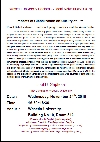WUDSN (Waseda University Doctoral Student Network) November 2010 Events
2010.11.16
Friday, November 19th, 2010
‘Escaping ASEAN soil: The case of Japan-Korea-China trilateral cooperation’
Japan, Republic of Korea (thereafter Korea), and China have for long been portrayed as rivals ? or at the very least competitors ? in the region of East Asia. Their competition for political initiative has been exercised in regional arrangements, and notably ASEAN Plus Three (APT). Yet it is precisely APT that spurred development of Japan-Korea-China summits, which since 2008 have been convened independently from ASEAN. The tension between competition in APT and emergence of closer cooperation in Northeast Asia prompts us to inquire into the rationale behind development of this trilateral framework. By taking into account China’s rise and Japanese and Korean reaction to it, this research is likely to elucidate a major research puzzle: why Japan, Korea and China ‘escaped’ ASEAN soil to pursue cooperation in a separate format.
- Presenter: Kamila Pieczara
- PHD CANDIDATE, UNIVERSITY OF WARWICK, U.K.
- Kamila Pieczara is a PhD candidate at the University of Warwick, U.K. Her research focuses on explaining emergence of Japan-Korea-China trilateral cooperation. Currently she is hosted by Professor Takashi Terada at the Organisation for Asian Studies (OAS) of Waseda. At the same time she is conducting field research in Tokyo under the Japan Society for the Promotion of Science (JSPS) short-term award. Kamila comes from Poland and speaks basic Japanese and Korean.
- Discussant: Katsumata Hiro
- Assistant Professor, WIAPS
Date: Friday, November 19th, 2010
Time: 12:10-13:10
Venue: Waseda University, Building No.19, Room 314
Presentation in English (No Interpreter)
Admission Free / No Pre-Registration Required
Organized by: Waseda University Doctoral Student Network (WUDSN)
Supported by: Global Institute for Asian Regional Integration (GIARI)
Wednesday, November 24th, 2010
Impacts of Globalization on Quality of Life:
Panel Data Evidence from Developing Countries and the Asia-Pacific
- Presenter: Jeet B. Sapkota
- PhD Candidate, Waseda University
- Jeet B. Sapkota is a PhD candidate in GSAPS and Research Fellow in GIARI, Waseda University. Since April 2010, he is serving as a Research Associate in Asian Development Bank Institute in Tokyo. Before came to Japan, he served for the National Planning Commission of the Government of Nepal as a Planning Officer.
In the context of ever increasing globalization trend affecting almost every aspects of people’s life both positive as well as negative ways, this study attempts to analyze the impacts of globalization on quality of life (QOL) in developing countries (DCs) in general and in the Asia-Pacific in particular. The study has three independent analyses using different datasets and both quantitative (panel data econometrics) as well as qualitative (content analytics) methods. First, using the panel data of 126 DCs from 1997 to 2005 it shows that globalization not only promotes human and gender development but also reduces human poverty significantly. Second, from the panel data of 19 Asia-Pacific countries from 1975 to 2005, it demonstrates that overall QOL, measured by the Human Development Index (HDI), of most countries in the region is moving closer to that of Japan (the benchmark country) and that globalization has a significant impact on this convergence process. Finally, it finds that the low-income countries (LICs) in the Asia-Pacific are moderately open (average score of 1.7 on the 0-3 point scale) towards global society. In conclusion, this study makes a number of scholarly contributions to research on the relationship between globalization and QOL by incorporating comprehensive measures and specific elements of both the dependent and explanatory variables with the most recent and a wide coverage of data and some methodological improvements in the analyses.
Date: Wednesday, November 24th, 2010
Time: 16:30-18:30
Venue: Room 310, Bldg. No.19, Waseda University
Presentation in Presentation in English (No Interpreter)
Admission Free / No Pre-Registration Required
Organized by: Waseda University Doctoral Student Network (WUDSN)
Supported by: Global Institute for Asian Regional Integration (GIARI)
Tuesday, November 30th, 2010
“A Political Institutional Approach to International News in the United States: The Case of China's Status as Most Favored Nation”
- Presenter: Troy Knudson
- PhD Candidate, Waseda University
Rather than identifying and interpreting the political effects of news content, this study takes an institutional approach. A quantitative methodology of news coverage regarding China’s status as most favored nation (1994-2000) is employed to ascertain if, and how, the news media acted as an institution in two respects: independently – through their selective emphasis on contingencies related to China’s status as most favored nation as well as the valence of their representation of the relationship between the United States and China; and politically – through their relevance to political activity in the United States Congress.
Date: Tuesday, November 30th, 2010
Time: 12:15-13:30
Venue: Waseda University, Building No.19, Room 309
Presentation in Presentation in English (No Interpreter)
Admission Free / No Pre-Registration Required
Organized by: Waseda University Doctoral Student Network (WUDSN)
Supported by: Global Institute for Asian Regional Integration (GIARI)

 Poster [59KB]
Poster [59KB] Poster [49KB]
Poster [49KB] Poster [66KB]
Poster [66KB]